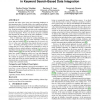144 search results - page 24 / 29 » Biomedical Retrieval: How Can a Thesaurus Help |
WWW
2005
ACM
14 years 8 months ago
2005
ACM
In this paper we present the Infocious Web search engine [23]. Our goal in creating Infocious is to improve the way people find information on the Web by resolving ambiguities pre...
SIGMOD
2010
ACM
14 years 20 days ago
2010
ACM
Scientific data offers some of the most interesting challenges in data integration today. Scientific fields evolve rapidly and accumulate masses of observational and experiment...
WWW
2008
ACM
14 years 8 months ago
2008
ACM
Web graphs are approximate snapshots of the web, created by search engines. Their creation is an error-prone procedure that relies on the availability of Internet nodes and the fa...
WWW
2010
ACM
14 years 1 months ago
2010
ACM
Video summarization is a mechanism for generating short summaries of the video to help people quickly make sense of the content of the video before downloading or seeking more det...
CVPR
2010
IEEE
14 years 4 months ago
2010
IEEE
Active learning methods aim to select the most informative unlabeled instances to label first, and can help to focus image or video annotations on the examples that will most impr...

